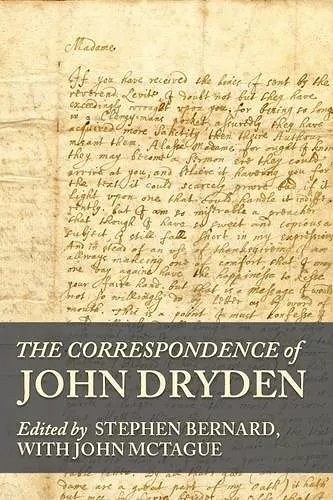The Correspondence of John Dryden
John McTague author Stephen Bernard editor
Format:Hardback
Publisher:Manchester University Press
Published:28th Jun '22
Should be back in stock very soon

The correspondence of John Dryden is the definitive edition of the letters of the most important playwright and poet of the late seventeenth century. He defined an age and his newly transcribed disparate correspondence is placed in the context of contemporaneous and current debates about literature, politics and religion. It is also the most important account of the relationship between an author and his bookseller of the time.
The illustrated correspondence contains a full biographical, textual introduction and calendar of letters. It is transcribed diplomatically and structured chronologically, with contextualising sections about particular correspondences.
The readership will be undergraduate, graduate and postgraduate students and academics with an interest in seventeenth century literature, politics, religion and culture.
The editor won the MLA Morton N. Cohen Award for a Distinguished Edition of Letters.
‘…these letters offer vital insight into Dryden as man and poet. Their publication in modern edition is a landmark for all scholars of his work.’
Year's Work in English Studies (2024)
'It is astounding to learn that only sixty-two letters, now collected with wonderfully thorough notes by Stephen Bernard and John McTague, survive from such a prolific and public hand. But the molehill is a mountain. Anyone remotely interested in this era will want to know … England’s greatest living poet … Dryden did for English literature what Augustus did for Rome, “He found it brick, and left it marble.' The New Criterion
'Perhaps the most unheralded literary event of recent months was an item titled The Correspondence of John Dryden, published by Manchester University Press and edited by two worthies unlikely to be household names, although they’ve done a masterly job. … Stephen Bernard and John McTague have made sure not to slight in any way what they deem relevant textual commentary … It’s not pedantry, just good scholarship. The Hudson Review
''The new generous edition of The Correspondence of John Dryden, edited by Stephen Bernard with John McTague, is full of gifts. Many of the letters themselves are gifts of news and writing, and news of writing, and as many others cover or record the grateful receipt of other objects passing between correspondents. ‘I always thought my Verses to my Cousin Driden were the best of the whole’, Dryden wrote … in his last surviving letter, ‘& to my comfort the Town thinks them so; & He, which pleases me most, is of the same Judgment as appears by a noble present he has sent me, which surprised me, because I did not in the least expect it’ … That sometimes surprising generosity extends happily into the ample editorial apparatus supplied to the seventy-eight letters making up the edition …Headnotes, sometimes to individual letters and on other occasions to groups of letters … helpfully locate them in their contexts; and end notes to each letter annotate them in a detail that often extends to the inclusion of whole texts to which only passing reference is made in the letter ... A gift, too, is the scrupulous and accurate attention that has been dedicated to the text of the letters, which where possible are freshly transcribed from manuscript witnesses.'
The Library: Transactions of the Bibliographical Society
'The editors of this volume have made superb transcriptions of an extremely difficult text. They provide a general introduction to the book and to each of the letters, with valuable explanatory notes and portraits of the correspondents … contain[ing] 63 letters from Dryden, including 16 to his publisher Jacob Tonson, 17 to his young cousin Elizabeth Steward, and 15 letters to him … striking phrases and witty retorts leap out of the dull sentences … His biographer Sir Walter Scott dismissed them as “singularly uninteresting.” But the editors defend them—and justify their book … the letters “represent Dryden in his many facets: wit, man of letters, bon vivant, patron, client, a politically and religiously conscientious family man.' The Article
ISBN: 9781526136367
Dimensions: 234mm x 156mm x 21mm
Weight: 658g
344 pages